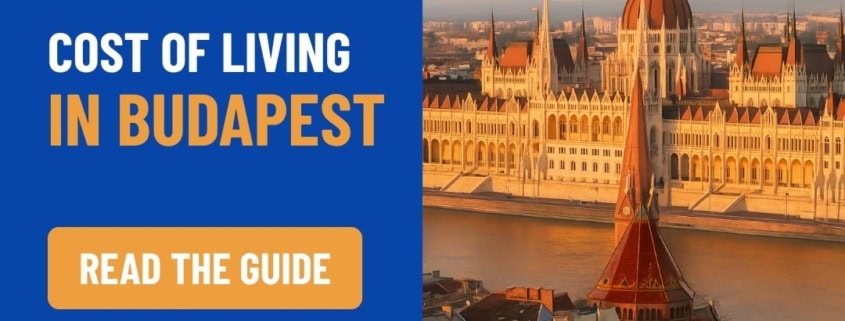An Expat Guide to the Cost of Living in Budapest
Editor’s note (updated June 2025): This article has been fully updated to reflect current expat living costs and economic conditions in Hungary.
The cost of living in Budapest, is one of the first things expatriates research when considering a move. In this guide, we provide up-to-date information based on June 2025 data and local insights.
As with any international relocation, there’s a lot to consider when settling into life in Budapest. You’ll find plenty of online guides, and Inter Relocation offers a wide range of services for inbound foreigners, including housing, schooling, immigration support, and more.
Budapest offers a unique mix of cultural depth and affordability. Understanding the cost of living in Budapest is crucial for expats planning a move.
We won’t attempt to cover everything about life in Hungary, but this article outlines the basics to help you estimate your expenses and set expectations. From accommodation and groceries to healthcare and transport, you’ll find real-world prices and useful expat tips here.
General Information
Budapest is home to approximately 1.68 million people across 525 square kilometers — making it slightly larger in area than Bucharest, Vienna, or Prague.
Since the 1990s, Budapest has developed a diverse expat scene, with sizeable communities from Germany, the UK, the US, India, China, and France, among others. If you’re moving to Hungary, chances are good that you’ll find a support network from your own country.
Living in Budapest is a unique experience. While English is widely spoken in restaurants, cafes, and tourist services, Hungarian remains essential for administrative tasks, doctor visits, and official procedures. Speaking the local language — or at least learning the basics — can significantly improve your daily life, although many expats manage without it.
Many expats say that the relatively low cost of living in Budapest was a key reason they chose the city over more expensive Western European capitals.
A bejegyzés megtekintése az Instagramon
Hungarian Currency
Even after joining the European Union, Hungary continues to use its own currency, the Hungarian Forint (HUF), often written as “Ft.” While some international shops and real estate agents may list prices in Euros, it’s important to keep an eye on the actual exchange rate.
As of June 2025, 1 Euro equals approximately 402 HUF, 1 US Dollar equals around 375 HUF, and 1 British Pound is roughly 475 HUF. These rates fluctuate, so for accurate and up-to-date exchange information, check a reliable source.
Most places accept international credit and debit cards, but it’s always useful to carry some cash. For instance, Budapest’s public transport ticket machines and smaller shops may not accept cards or may not be able to break large denominations like the 20,000 HUF note.
In addition to the numerous ATMs available throughout the city, many also offer Euros alongside the local currency. Currency exchange booths are common in central Budapest, but be sure to compare rates and avoid those with high commission fees.
Keeping track of exchange rates is important when calculating the real cost of living in Budapest, especially if your income is in a different currency.
A bejegyzés megtekintése az Instagramon
Infrastructure in Budapest
Budapest’s infrastructure is well-developed and continues to improve, contributing to the overall cost of living in Budapest in terms of transport, mobility, and utilities.
All four metro lines are fully operational, alongside an extensive network of buses, trams, and trolleybuses. Most expats find that they don’t need a car to get around — the city is very walkable and well-connected.
Owning a car in Budapest can be inconvenient, especially due to limited parking and fees. Monthly parking costs vary widely by district, ranging from 22,000 to 60,000 HUF. Residents may apply for a parking permit in their local district, but eligibility can depend on both car and property ownership.
If you decide to buy a car, expect to pay approximately 85,000–100,000 HUF per year for full insurance and road tax combined. Public e-mobility options (like e-scooters and shared cars) are also expanding in popularity.
For current parking permit rules and district-level details, visit the official Budapest city portal: budapest.hu.
The convenience of public transport contributes to the overall cost of living in Budapest, which remains relatively low compared to Western Europe.
Public Transport
Buses, trains, trams, trolleys, and the four metro lines are reliable and run on schedule. The government continues to upgrade the metro system, and even the older stations are generally clean and safe.
A monthly public transport pass from BKK (Budapesti Közlekedési Központ) costs 8,950 HUF (approx. £19 / $23) for adults and grants access to all standard public transport in the city — a key reason behind the relatively low cost of living in Budapest.
Walking is also a popular and practical option in the inner districts, while cyclists benefit from an expanding network of bike lanes and the BuBi bike-sharing program.
Taxis are widely available and must use meters by law. Avoid unmarked or unofficial taxis, and stick with reliable brands like or use trusted ride-hailing apps. These services offer cashless payments and transparent pricing.
Hungary enforces a zero-tolerance policy for drinking and driving, so taking a taxi is often the safest option for a night out.
Tram 4/6 — which runs 24/7 — provides excellent connectivity across central Budapest. Always validate your ticket or carry your travel pass, as ticket inspections are routine, even at night. On the metro, make sure to validate your paper ticket before crossing the line to the platform. Controllers often wait just past the entrance.
We also recommend downloading the Budapest GO app, which allows you to plan your route, buy digital tickets, and check schedules in real time.
Overall, public transport and mobility options contribute significantly to the affordable cost of living in Budapest.
A bejegyzés megtekintése az Instagramon
Budapest Accommodation
Finding a flat in Budapest in 2025 is increasingly competitive. Demand is high, particularly for smaller apartments, while supply is tight due to a combination of tourism growth and property owners shifting to short-term lets or selling their units. This has led to steadily rising rents over the past few years — one of the main contributors to the increased cost of living in Budapest.
Most landlords now require tenants to sign at least a one-year lease, and many contracts include inflation clauses tied to the Hungarian Central Statistical Office (KSH) rates. Additionally, there is a growing trend for rents to be denominated in Euros rather than Forints to protect landlords from currency fluctuations.
Tenants are also often asked to sign an Eviction Statement at a notary public during lease signing, and competition among renters has made it a landlord’s market: renters must be ready to act fast, pay asking price, and present themselves as reliable tenants. Corporate or expat status no longer guarantees preferential treatment.
Fraud risks have increased in recent months, with reports of fake agents demanding deposits upfront and disappearing. It is strongly advised to use trusted agencies like Inter Relocation to navigate the market safely.
The city center remains the most expensive area, but outer districts and suburban neighborhoods are gaining popularity for those seeking more space and quieter surroundings. While it’s still possible to find reasonably priced apartments, expect to move quickly and negotiate less.
A moratorium on new short-term lets (including Airbnb) has been in effect since January 2025, and District VI has already voted for a total ban starting in 2026 — a move expected to shift more apartments back to the long-term market, though the impact may take time.
Rising rental prices have become the primary factor influencing the overall cost of living in Budapest, particularly for newcomers without local connections.
A bejegyzés megtekintése az Instagramon
While some expats still browse Facebook groups like “Rent in Budapest” for available listings, this approach comes with risks. Scams have become more frequent in recent years, including fake listings and impersonators demanding deposits upfront. If you choose this route, never transfer money before verifying the property and the person offering it.
For a safer and more professional experience, many expats opt to work with a relocation services provider such as Inter Relocation. These agencies not only search the full property market on your behalf but also represent your interests as a tenant — negotiating terms, reviewing lease agreements, and ensuring legal compliance. While a service fee applies, this investment often pays for itself in peace of mind and time saved.
If you haven’t secured long-term accommodation before arrival, short-term rentals (such as through Airbnb) are still available — though increasingly limited due to the moratorium on new listings. It’s recommended to book a verified apartment for your initial stay and begin your long-term search with local support as soon as you arrive.
The “real” cost of living in Budapest: renting an apartment
According to a May 2025 report, the average asking rent in Budapest has risen above the HUF 250,000 mark — approximately HUF 252,000 — while tenants are typically willing to pay around HUF 219,000 per month. Similarly, KSH-Ingatlan.com data show a 6.7% year-on-year rise in Budapest rents as of March 2025, continuing a steady increase from the previous year.
Other sources suggest that average rents now range between HUF 250,000–270,000, with smaller apartments (under 40 m²) available in some districts for HUF 180,000–200,000.
Numbeo estimates that Budapest remains approximately 55% cheaper than New York City (excluding rent), with average monthly living costs for a single person calculated at approximately HUF 276,000, excluding accommodation.
Rent segmentation & trends
In prime central districts such as Districts V, VI, VII, IX, XI, and XIII, rental prices typically fall between HUF 250,000 and 322,000 depending on size, condition, and location.
In outer districts like XV, XXI, and XXIII, rents can be as low as HUF 150,000–180,000. In Budapest’s XI District, average rents currently hover around HUF 270,000.
What’s driving these changes?
Annual rent growth reached 9.6% in 2024, and while price increases have begun to moderate, they still rose by 6.7% year-on-year in Q1 of 2025. Supply has also increased, with approximately 17,800 flats listed on the market as of March 2025 — a 21% increase compared to the previous year.
Proposed regulations aiming to restrict short-term rentals (such as Airbnb) are expected to gradually return more properties to the long-term rental market, which may help to stabilize prices.
Recommendations for expats
Expect typical 1–2 bedroom apartments in central areas to cost between HUF 250,000 and 300,000 or more. Cheaper options are available in outer districts, starting around HUF 150,000–180,000, although these may come with trade-offs in terms of location and amenities.
It’s advisable to negotiate when possible, especially if the rental market begins to soften. Stay up to date on short-term rental policy changes, as these can significantly impact supply and demand in various districts.
A bejegyzés megtekintése az Instagramon
Common cost
One essential part of the cost of living in Budapest is the so-called “common cost” (közös költség), a monthly fee paid to the building management. As of 2025, this typically ranges between HUF 20,000 and 60,000 per month, depending on the size of the flat and whether utilities like water or heating are included.
General rates:
-
Without water: 130–200 HUF/m²/month
-
With water: 200–300 HUF/m²/month
For an average 50–75 m² apartment, this adds up to about HUF 25,000–40,000 monthly.
In high-end buildings, common costs can exceed HUF 48,000 per month. However, these often include access to a 24/7 concierge, gym, spa, or wellness services.
In addition to rent and common cost, tenants usually pay their own utilities separately. For a mid-size apartment, expect the following monthly costs:
-
Electricity: HUF 8,000–12,000
-
Gas: HUF 15,000–35,000 (higher in winter)
-
Water and sewage: HUF 5,000–8,000
Altogether, utility bills range between HUF 30,000 and 55,000 per month for a 50–60 m² apartment, depending on consumption and the season.
When signing a lease, it is common for landlords to request two months’ deposit and one month’s rent in advance. Be sure to document the condition of the apartment and appliances when moving in to protect your deposit.
Grocery Markets
Budapest offers a wide range of shopping options, from local markets and small neighborhood shops to discount supermarkets like Aldi, Lidl, and Penny, as well as larger hypermarkets such as Auchan and Tesco located on the outskirts of the city. Each district also typically has its own traditional market (piac), where locals shop for fresh fruits, vegetables, meat, and dairy products. These markets can be a great way to find seasonal produce and support local farmers.
As of mid-2025, food prices in Hungary have increased significantly compared to previous years. According to recent data, the average monthly grocery bill for one person ranges between HUF 80,000 and 150,000, depending on shopping habits and dietary preferences. For two people, this translates to approximately HUF 100,000 to 300,000 per month, or HUF 30,000 to 75,000 per week.
If you shop mainly at budget chains and avoid imported goods or premium brands, your overall costs can be kept on the lower end of the spectrum. However, shopping at organic stores or relying on convenience products will push your monthly grocery budget higher.
For many expats, grocery spending is one of the more controllable parts of the cost of living in Budapest, especially when compared to fixed expenses like rent or insurance.
Eating Out
Eating out in Budapest has become more expensive in recent years, but it still remains relatively affordable by Western European standards. A meal at an inexpensive restaurant now costs around 4,000 HUF per person, while a three-course meal for two at a mid-range restaurant will typically be about 20,000 HUF. Street food or fast-food options, like kebabs or burgers, usually cost between 3,000 and 5,000 HUF.
Beer prices have also increased. A local draft beer now costs approximately 1,000 HUF, but in central tourist zones or ruin bars, it can range from 1,200 to 1,500 HUF. Imported beers are typically around 1,100 HUF. A cappuccino or similar coffee drink averages 850 to 1,000 HUF in most cafés.
Specialty cakes and desserts have also seen a price jump. A slice of vegan cake in the city center now costs around 1,500 HUF. While bakeries remain plentiful across the city, and fresh bread is still widely available, prices are generally higher than in previous years.
Overall, if you eat out occasionally and avoid touristy areas, you can still enjoy a good variety of affordable meals, but the days of ultra-cheap dining are mostly over.
A bejegyzés megtekintése az Instagramon
Clothing
Clothing prices in Budapest are comparable to other European capitals, though inflation and brand pricing have pushed costs slightly higher in 2025. A pair of mid-range jeans typically costs around 27,000 to 30,000 HUF. Branded athletic footwear now starts at approximately 30,000 HUF, with some models exceeding 90,000 HUF depending on style and store.
As in most cities, Budapest has upscale shopping districts lined with international brands, particularly in District V near Váci utca. However, you can also find more affordable options at shopping malls like Arena Mall or Árkád, as well as discount fashion retailers such as H&M, Deichmann, or CCC.
Expats should also be aware that while international sizes are generally consistent, some local brands may have different sizing standards, so trying on clothes before purchase is recommended.
While prices have increased slightly, clothing still represents a manageable portion of the overall cost of living in Budapest.
Health Insurance and Dental Care
Public healthcare in Hungary is funded through social security contributions. If you are employed, your access to the state healthcare system is automatic. EU and UK citizens can also use their European Health Insurance Card (EHIC) or Global Health Insurance Card (GHIC) for essential treatment. However, the public system often involves long wait times and limited English-speaking staff, which is why many expats prefer private coverage.
While public healthcare is available, many expats opt for private insurance — a factor that may increase your monthly cost of living in Budapest.
Hungarian dental care is world-class and so popular and reasonably priced that there is still a large market in dental tourism from the UK, Ireland and elsewhere. Basically, find a dentist you like and you’re set for the duration.
Private health insurance plans for individuals start from around 10,000 to 20,000 HUF per month, depending on age and provider. These plans offer quicker access to English-speaking general practitioners and specialists in private clinics.
Typical private medical costs in Budapest include:
-
General practitioner visit: 17,000–24,000 HUF
-
Specialist consultation: 24,000–41,000 HUF
-
MRI (one body area): approximately 125,000 HUF
Private dental care in Hungary is highly regarded and remains much more affordable than in Western Europe or North America. As a result, dental tourism remains popular. Dental care is one of the few areas where expats can actually reduce their cost of living in Budapest compared to their home countries.
Typical dental costs in 2025:
-
Single dental implant: around 230,000 HUF
-
Porcelain crown: 140,000–150,000 HUF
-
Root canal treatment: about 60,000 HUF
-
Full jaw All-on-4 implants: approximately 1.7 million HUF
-
Full jaw All-on-6 implants: approximately 2.7 million HUF
The quality of care is generally excellent, and Budapest has a large number of reputable clinics catering specifically to international patients.
Finding a dentist or general practitioner who speaks fluent English is not difficult, especially in central districts — yet another reason why the cost of living in Budapest continues to offer good value for expats.
Still guessing the real cost of living in Budapest?
Skip the guesswork. We’ve lived it, priced it, and negotiated it — on your behalf.
– Housing. – Healthcare. – Hidden costs. – Local traps.
Inter Relocation helps you get it right from day one.
Start your relocation smart →

 Inter Relocation
Inter Relocation






